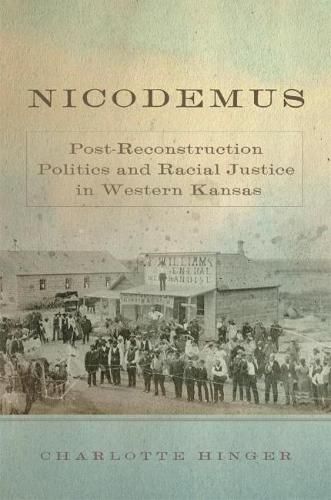Readings Newsletter
Become a Readings Member to make your shopping experience even easier.
Sign in or sign up for free!
You’re not far away from qualifying for FREE standard shipping within Australia
You’ve qualified for FREE standard shipping within Australia
The cart is loading…






Pushed out of the South as Reconstruction ended and as white landowners, employers, and
Redeemer
governments sought to reestablish the constraints of slavery, thousands of African Americans migrated west in search of better opportunities. As the first well-known all-black community on the plains, Nicodemus, Kansas, became a national exemplar of black self-improvement. But Nicodemus also embodied many of the problems facing African Americans during this time. Diverging philosophies within the community, Charlotte Hinger argues, foretold the differences that continue to divide black politicians and intellectuals today.
At the time Nicodemus was founded, politicians underestimated the power of African American voters. But three of the town’s black homesteaders - Abram Thompson Hall, Jr., Edward Preston McCabe, and John W. Niles - exerted extraordinary influence over county, state, and national politics. Hinger examines their divergent strategies for leading their community and for relating to white people, which reflected emerging black worldviews across the United States as African Americans grappled with the responsibilities accompanying their new freedom. Hall supported racial uplift, McCabe insisted on achieving equality through politics and legislation, and Niles advocated reparations for slavery. Hall and McCabe, both northerners, had distinguished educations, while Niles, a former slave, was a gifted orator. Their differing approaches to creating a new civilization on the prairie, seeking justice for blacks, and improving the situation of Nicodemus citizens roiled Kansas politics, already in turmoil over temperance and woman’s suffrage.
Nicodemus was a microcosm of all the issues facing black Americans in the late nineteenth century, and Hall, McCabe, and Niles are archetypes for powerful philosophies that have persisted into the twenty-first century. This study of their ideas and the ways they shaped Nicodemus offers a novel perspective on the most famous post-Civil War African American community in the West.
$9.00 standard shipping within Australia
FREE standard shipping within Australia for orders over $100.00
Express & International shipping calculated at checkout
Pushed out of the South as Reconstruction ended and as white landowners, employers, and
Redeemer
governments sought to reestablish the constraints of slavery, thousands of African Americans migrated west in search of better opportunities. As the first well-known all-black community on the plains, Nicodemus, Kansas, became a national exemplar of black self-improvement. But Nicodemus also embodied many of the problems facing African Americans during this time. Diverging philosophies within the community, Charlotte Hinger argues, foretold the differences that continue to divide black politicians and intellectuals today.
At the time Nicodemus was founded, politicians underestimated the power of African American voters. But three of the town’s black homesteaders - Abram Thompson Hall, Jr., Edward Preston McCabe, and John W. Niles - exerted extraordinary influence over county, state, and national politics. Hinger examines their divergent strategies for leading their community and for relating to white people, which reflected emerging black worldviews across the United States as African Americans grappled with the responsibilities accompanying their new freedom. Hall supported racial uplift, McCabe insisted on achieving equality through politics and legislation, and Niles advocated reparations for slavery. Hall and McCabe, both northerners, had distinguished educations, while Niles, a former slave, was a gifted orator. Their differing approaches to creating a new civilization on the prairie, seeking justice for blacks, and improving the situation of Nicodemus citizens roiled Kansas politics, already in turmoil over temperance and woman’s suffrage.
Nicodemus was a microcosm of all the issues facing black Americans in the late nineteenth century, and Hall, McCabe, and Niles are archetypes for powerful philosophies that have persisted into the twenty-first century. This study of their ideas and the ways they shaped Nicodemus offers a novel perspective on the most famous post-Civil War African American community in the West.